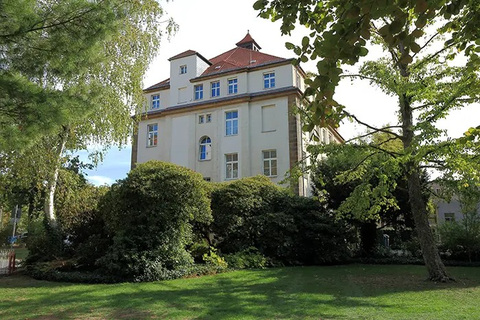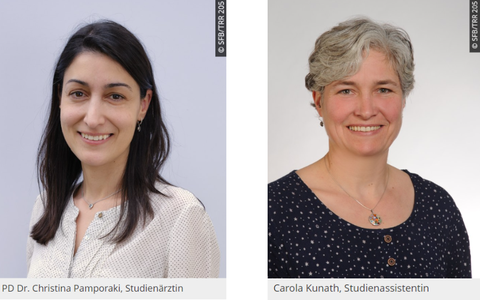Studienzentrum in Dresden

Endokrinologische Studienambulanz
Studien des Studienzentrums in Dresden:
Multizentrische prospektive Studie zum diagnostischen Wert von Steroidprofilen beim primärem Hyperaldosteronismus
PROSALDO (A multicentre PROspective study on the diagnostic value of Steroid profiling in primary ALDOsteronism) ist eine multizentrische prospektive Studie zum diagnostischen Wert von Steroidprofilen beim primärem Hyperaldosteronismus. Hauptziel der Studie ist die Ermittlung prädiktiver Werte der peripheren venösen Plasmasteroide für die Diagnose und Subtypisierung des primären Aldosteronismus. In die Studie können alle Personen eingeschlossen werden, die an Bluthochdruck leiden und bei denen ein Anfangsverdacht auf einen primären Hyperaldosteronismus vorliegt. Die Studie ist für einen Zeitraum von insgesamt 3 Jahren angelegt. Die ersten Patienten wurden ab März 2019 eingeschlossen.
Studienzentren in Deutschland sind derzeit das Universitätsklinikum Carl-Gustav-Carus an der TU Dresden (Studienleitung: Graeme Eisenhofer) sowie die Medizinische Klinik Innenstadt der LMU München (Martin Reincke) und das Universitätklinikum der Julius-Maximilians-Universität Würzburg (Stephanie Hahner). Außerhalb von Deutschland sind Studienzentren in den Niederlanden die Radboud University Nijmegen (Jaap Deinum), in der Schweiz das Universitäts Spital Zürich (Felix Beuschlein), in Polen das Institute of Cardiology in Warschau (Aleksander Prejbisz) und in Italien die University of Turin (Paolo Mulatero) an der Studie beteiligt. (Quelle: Deutsche Gesellschaft für Endokrinologie)
PROSPHEO ist eine internationale multizentrische Register-Studie zu Phäochromozytomen und Paragangliomen (PPGLs). Die wesentliche Frage der Studie besteht darin, ob eine verbesserte Nachsorge (pro-aktives, strukturiertes und periodisches Krankheitsscreening und –management) zu weniger Morbidität sowie Mortalität und damit zu einem verbesserten Langzeitergebnis im Vergleich zur Standardnachsorge führt. Im Rahmen der Studie werden Patienten randomisiert einer Intervention (verbesserte Nachsorge vs. Standard-Nachsorge) zugeordnet.
An der Studie können alle Patienten teilnehmen, die an einem PPGL leiden, an einem solchen in der Vorgeschichte behandelt wurden oder aus familiären/genetischen Gründen eine hohe Erkrankungswahrscheinlichkeit haben. Die Studie ist für einen Zeitraum von insgesamt 12 Jahren angelegt. Die ersten Patienten wurden ab November 2017 eingeschlossen.
Studienzentren in Deutschland sind derzeit das Universitätsklinikum Carl-Gustav-Carus an der TU Dresden (Christina Pamporaki) sowie die Medizinische Klinik Innenstadt der LMU München (Martin Reincke) und das Universitätklinikum der Julius-Maximilians-Universität Würzburg (Martin Fassnacht). Außerhalb von Deutschland sind Studienzentren in den Niederlanden die Radboud University Nijmegen (Henri Timmers) und in der Schweiz das Universitäts Spital Zürich (Felix Beuschlein) an der Studie beteiligt. (Quelle: Deutsche Gesellschaft für Endokrinologie)
Im Europäischen Netzwerk für das Studium von Nebennierentumoren (ENS@T) arbeiten europaweit spezialisierte Zentren zusammen, gut- und bösartige Nebennierentumore zu untersuchen. Durch den Vergleich klinischer Daten und die Untersuchung von Tumormaterial oder von Blutproben können Unterschiede in der Entstehung dieser Tumore und ihrer klinischen Eigenschaften untersucht werden und dadurch indirekt die Versorgung Betroffener verbessert werden.
Das Cushing-Syndrom ist eine sehr seltene hormonelle Erkrankung. Es entsteht durch eine Überproduktion des körpereigenen Hormons Cortisol (Hypercortisolismus), dass durch einen Tumor ausgelöst wird. Bisher wurde das Cushing-Syndrom nicht ausreichend erforscht und weltweit ist die Betreuung von Patientinnen und Patienten nicht zufriedenstellend. Aus diesem Grund wurde 2012 das Deutsche Cushing-Register gegründet, um die Erkrankung besser zu untersuchen und die Behandlung für Patientinnen und Patienten zu verbessern. Durch die Teilnahme am „Deutschen Cushing-Register“ unterstützen Sie aktiv die Erforschung des Cushing-Syndroms und helfen die Erkrankung langfristig besser zu behandeln.
Das Conn-Syndrom (primäre Hyperaldosteronismus) beschreibt eine Erkrankung der Nebennieren, bei der eine erhöhte Produktion des körpereigenen Hormons Aldosteron vorliegt. Bisher wurde das Conn-Syndrom nicht ausreichend erforscht und weltweit ist die Betreuung von Patientinnen und Patienten nicht zufriedenstellend. Aus diesem Grund wurde das Deutsche Conn-Register gegründet, um die Erkrankung besser zu untersuchen und die Behandlung für Patientinnen und Patienten zu verbessern. Durch die Teilnahme am „Deutschen Conn-Register“ unterstützen Sie aktiv die Erforschung des Conn-Syndroms und helfen die Erkrankung langfristig besser zu behandeln.

